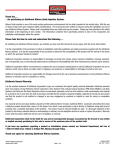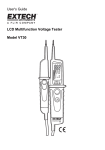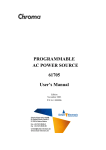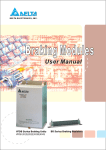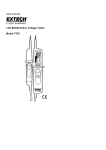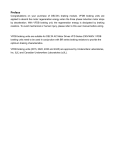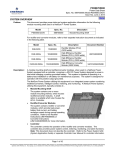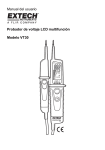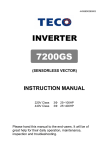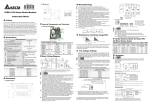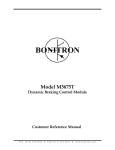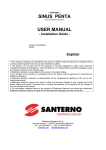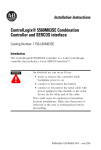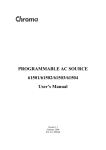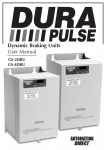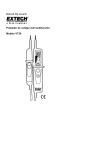Transcript
\ Basic Wiring Diagram Thank you for choosing DELTA’s braking module. VFDB braking units are applied to absorb the motor regeneration energy when the three-phase induction motor stops by deceleration. With VFDB braking unit, the regeneration energy will be dissipated in dedicated braking resistors. To prevent mechanical or human injury, please refer to this instruction sheet before wiring. VFDB braking units are suitable for DELTA AC Motor Drives VFD Series 460V. VFDB braking units need to be used in conjunction with BR series braking resistors to provide the optimum braking characteristics. The content of this instruction sheet may be revised without prior notice. Please consult our distributors or download the most updated version at http://www.delta.com.tw/industrialautomation. Y Specifications VFDB Braking Units Specification 460V Series Model VFDB□□□□ Input Rating Output Rating Max. Motor Capacity (KW) Max. Discharge Current (A) 10%ED Continuous Discharge Current (A) Braking Start-up Voltage (DC) Protection Over-current level (A) Model no. Specification 4110 4160 4185 BR1K5W005 1500W 5.0Ω 110 160 185 BR1K2W6P8 1200W 6.8Ω 126 190 225 BR1K2W008 1200W 8.0Ω 45 50 100 BR1K5W012 1500W 12Ω 618/642/667/690/725/750±6V BR1K2W015 1200W 15Ω 400-750VDC BR1K5W040 1500W 40Ω DC Voltage Min. Equivalent Resistor for Each Braking Unit Environment Braking Resistors 6Ω 4Ω 3.4Ω BR1K0W050 1000W 50Ω 190 290 340 BR1K0W075 1000W 75Ω Power Charge Display Blackout until bus(DC+~DC-)voltage is below 100VDC Overheat Alarm Output Relay contact 3A 250Vac/28Vdc(RA.RC) Installation Location Indoor(no corrosive gases, metallic dust) Operating Temperature -10℃~+50℃ (14oF to 122oF) Storage Temperature -20℃~+60℃ (-4oF to 140oF) Humidity Less than 90%RH Non-condensing 2 Z Dimensions -Braking Resistors Mechanical Configuration Do not proceed with wiring while power is applied to the circuit. The wiring gauge and distance must comply with the electrical code. The +(P), -(N) terminals of the AC motor drive (VFD Series), connected to the braking unit (VFDB), must be confirmed for correct polarity lest the drive and the braking unit be damaged when power on. When the braking unit performs braking, the wires connected to DC+, DC-, B1 and B2 would generate a powerful electromagnetic field for a moment due to high current passing through. These wires should be wired separately from other low voltage control circuits lest they make interference or mis-operation. To prevent personal injury, do not connect/disconnect wires or Inflammable solids, gases or liquids must be avoided at regulate the setting of the braking unit while power on. Do not the location where the braking resistor is installed. The touch the terminals of related wiring and any component on braking resistor had better be installed in individual PCB lest users be damaged by extreme dangerous DC high metallic box with forced air-cooling. voltage. Connect the ground terminal to the Earth Ground. The ground lead must be at least the same gauge wire as Do not connect DC reactor between the braking unit and the DC-bus capacitor of the AC motor driver. leads +(P), -(N). Wiring distance Please install the braking resistor with forced air-cooling or the equivalent when frequent deceleration braking is performed (over 10%ED). The ring terminals are suggested to be used for main circuit wiring. Make sure the terminals are fastened before power on. Braking Time Function Explanation T1 Cycle Time OC The SLAVE braking application of three braking units is shown as the above diagram. After wiring, the jumper of first unit shall be set as “MASTER” and that of others must be set as “SLAVE” to complete the system installation. OH -(N) Circuit SLAVE Circuit Fault Circuit Wire Gauge AWG (mm ) Screw Torque DC+,DC- 4~6AWG (21.2~13.3mm2) M8 30 kgf-cm (26 in-lbf) B1,B2 4~6AWG (21.2~13.3mm2) M8 30 kgf-cm (26 in-lbf) 2 18~20AWG (0.8~0.5mm ) (with shielded wires) M2 4 kgf-cm (3 in-lbf) 18~20AWG (0.8~0.5mm2) M2 4 kgf-cm (3 in-lbf) M1,M2 Input S1,S2 RA,RC 380Vac 400Vac 415Vac 440Vac 460Vac 480Vac Braking Start-up voltage DC Bus (DC+,DC-) Voltage 618Vdc 642Vdc 667Vdc 690Vdc 725Vdc 750Vdc NOTE: Input Power With Tolerance ±10% 480V 460V 440V Input Voltage Se tting 415V 400V 380V M DC+ DC - DC+ DC - S1 S2 S1 S2 M1 M2 M1: SLAVE output signal+ M2: SLAVE output signalS1: SLAVE input signal+ S2: SLAVE input signal- M B2 BR B1 O.L. B2 BR M1 M2 S S B1 O.L. S1 S2 RA RC SLAVE output/input terminal NOTE: Please use shielded wires while wiring. B2 BR ` Braking Resistors & Braking Units Use in the AC Drives Applicable Motor 125% Braking Torque/ 10%ED HP KW Braking Torque (kg-M) Resistor Value Spec. for Each AC Motor Drive 150 175 215 250 300 375 425 475 110 132 160 185 220 280 315 355 74.5 89.4 108.3 125.3 148.9 189.6 213.3 240.3 12000W 6Ω 18000W 4Ω 18000W 4Ω 21000W 3.4Ω 24000W 3Ω 36000W 2Ω 36000W 2Ω 42000W 1.7Ω Braking Unit Part No. and Quantity 4110 4160 4160 4185 4110 4160 4160 4185 1 1 1 1 2 2 2 2 Braking Resistors Part No. and Quantity BR1K2W015 BR1K5W012 BR1K5W012 BR1K5W012 BR1K2W015 BR1K5W012 BR1K5W012 BR1K5W012 10 12 12 14 20 24 24 28 Max. Discharge Current (A) Min. Equivalent Resistor Value 126 190 190 225 252 380 380 450 6Ω 4Ω 4Ω 3.4Ω 3Ω 2Ω 2Ω 1.7Ω a Wiring Examples of Braking Resistors NOTE: Before wiring, please notice equivalent resistors value shown in the column “Equivalent resistors specification for each braking unit” in the above table to prevent damage. 460V 150HP 460V 175HP/215HP 460V 250HP 460V 375HP/425HP Before regulating the power voltage, make sure the power has been turned off. Please set power voltage as the possible highest voltage for unstable power system. Take 380VAC power system for example. If the voltage may be up to 410Vac, 415VAC should be regulated. For DELTA’s AC motor drive VFD Series, please set parameter (Over Voltage Stall Prevention) as “close” to disable over-voltage stall prevention, to ensure stable deceleration characteristic. 460V Model AC Power Voltage Terminal Mark Output M1 M2 B1 The Selection of Power Voltage and Operation Potential of PN DC Voltage Terminal Wire Gauge Power Input Circuit Braking Resistor DC+ DC - VFD Series NOTE 2 The position of the jumper MASTER/SLAVE SETTING JUMPER ED% = T1/T0x100(%) 1. Regulation of power voltage: the power source of the braking unit is DC voltage from +(P), -(N) terminals of the AC motor drive. It is very important to set the power voltage of the braking unit based on the input power of the AC motor drive before operation. The setting has a great influence on the potential of the operation voltage for the braking unit. Please refer to the table below. 480V 460V 440V 415V 400V 380V S +( P) _ The Voltage Settings VFDB OH Overheat lamp 2. MASTER/SLAVE setting: The MASTER/SLAVE jumper is set “MASTER” as factory setting. The “SLAVE” setting is applied to two or more braking units in parallel, making these braking units be enabled/disabled synchronously. Then the power dissipation of each unit will be equivalent so that they can perform the braking function completely. T0 Explanation: The definition of the barking usage ED(%) is for assurance of enough time for the braking unit and braking resistor to dissipate away heat generated by braking. When the braking resistor heats up, the resistance would increase with temperature, and braking torque would decrease accordingly. CHARGE ACT OC Over-current lamp 100% [ Individual Parts and - VFDB Braking Units Brake lamp Input Voltage Setting Factory setting:440V ] Wiring Notice Wall-mounted enclosed type IP10 Z Dimensions Power lamp O.L. ^ Definition for Braking Usage ED% 2 9.8m/s (1G)under 20Hz、2m/s (0.2G)at 20~50Hz Vibration 6. Besides using thermal overload relay to be the protection system and braking resistor, temperature switch can be installed on braking resistor side as the protection. The temperature switch must comply with the braking resistor specification or contact your dealer. CHARGE ACT Voltage X Preface Operation Explanation: 1. For safety consideration, install an overload relay between the braking unit and the braking resistor. In conjunction with the magnetic contactor (MC) prior to the drive, it can perform complete protection against abnormality. 2. The purpose of installing the thermal overload relay is to protect the braking resistor from damage due to frequent braking, or due to braking unit keeping operating resulted from unusual high input voltage. Under such circumstance, just turn off the power to prevent damaging the braking resistor. 3. Please refer to the specification of the thermal overload relay. 4. The alarm output terminals (RA, RC) of the braking unit will be activated when the temperature of the heat sink exceeds o o 80 C. It means that the temperature of the installation environment may exceed 50 C, or the braking %ED may exceed 10%ED. With this kind of alarm, please install a fan to force air-cooling or reduce the environment temperature. If the condition isn’t due to the temperature, the control circuit or the temperature sensor may have been damaged. At this time, please send the braking unit back to the manufacturer or agency for repair. NFB 5. The AC Motor Drive and braking unit MC Motor R/L1 U/T1 R/L1 will be electrified at the same time while S/L2 V/T2 S/L2 IM turning on the NFB (No-fuse breaker). For Thermal T/L3 W/T3 T/L3 the operation/stop method of the motor, Overload please refer to the user manual of the AC O.L. VFD Series Relay MC +(P) DC+ B1 Motor Drives VFD Series. The braking unit O.L. DC- VFDB -(N) will detect the inner DC voltage of the AC SA BR Brake E.F RA Surge Absorber motor drive when it stops the motor by Brake Unit DCM RC B2 Resistor deceleration. The extra regeneration will Therm al Overload be dissipated away rapidly by the braking Relay or Tem perature switch Temperature switch resistor in the form of heat. It can ensure the stable deceleration characteristic. 460V VFDB Series Braking Modules Instruction Sheet Input voltage setting for VFD B 4110/4160/4185 460V 475HP 460V 300HP
